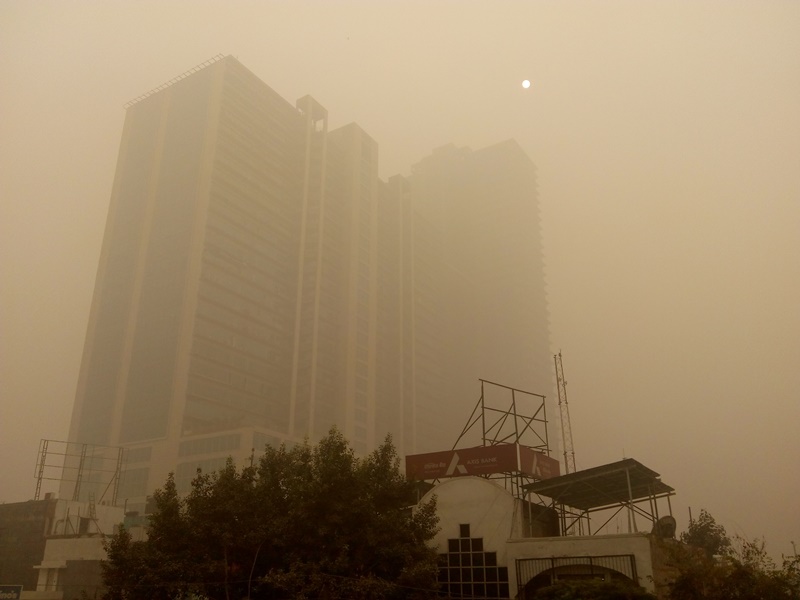On top of three weeks of dangerous levels of air pollution in Delhi and surrounding areas, comes the news that Delhi also has the most unsafe tap water in the country. The declaration of a health emergency a couple of weeks ago received global media attention, and myriad anxious enquiries from friends and family about personal well-being and safety.
As citizens of this most polluted city in the world, what response should we have expected from various institutions of governance? What did they do to resolve, mitigate or adopt measures to tackle the problem? Regulatory bodies like the National Green Tribunal (NGT) issued notices to state and central governments to implement already-agreed emergency action plans—shut down schools, enforce the “odd-even” scheme to control four-wheel vehicular movement, etc. Leaders of municipal, provincial and national governments issued public statements and newspaper advertisements calling for ‘decisive’ action by the responsible agencies. Even the Supreme Court conducted a hearing of some sort. It now transpires (through media reports) that no serious discussions to resolve the issue were held involving the various governmental and regulatory bodies. The attendance of 29 invited members of parliament to a recent meeting on this issue was less than 15%.
This is not the first time Delhi has faced such severe levels of air pollution. It has become an annual phenomenon for the past several years. Every year, similar ‘curative’ measures are implemented; every year, debates in the media suggest that ‘preventive’ measures are required; every year, ‘scientific’ evidence about the causes—fire-crackers at Diwali, vehicular emissions, industrial emissions, crop-burning in neighbouring states, dust due to construction—is presented and ‘dismissed’ for lack of precise causation.
Delhi is the national capital of the largest democracy and third largest economy in the world; all senior national leaders and bureaucrats (ministers, politicians, officials, judges, military, media, academia) reside in Delhi; all embassies and international diplomats (including UN agencies) have offices and residences here; a large number of multi-national companies have their offices and senior staff in the National Capital Region (NCR) where nearly 50 million people live and work; it has the highest national per capita income, and perhaps the highest percentage of highly educated population in the country.
It is this Delhi—and NCR—which is unable to find and implement a sustainable solution to the severe air and water pollution problems that affects nearly 30 million people. This is not some remote rural area or small town, tucked away in India’s vast hinterland, away from government and media attention. Delhi is not the first city in the world to face this type of problem. Many rapidly industrialising urban habitations with high concentration of populations face, but also solve, such challenges—New York, Los Angeles, London, Beijing, to name a few. Why then is Delhi not able to implement a sustainable solution to this pollution problem? Why have our governance institutions failed the ordinary citizen?
History has many lessons about failure of democratic governance. It has been variously argued that ‘governance of democracy’ has become highly complex and problematic in recent decades. Electoral democratic governance is ‘out-sourced’ to a small group of officials and tiny coteries of political leaders, once the elections are over. Governance of the country—its economy, social services, defence, technology, etc.—is assumed to be the responsibility of this small team. The new ‘democratically’ elected government looks at a short time horizon of three to four years, before the next round of elections is due. Policies, actions, events and pronouncements that have a short ‘shelf-life’ are attempted, before campaigning begins afresh with a fresh set of promises. Citizens of such democracies are happy to cast their vote to elect ‘their’ government. Post elections, these voters ‘relax’, knowing the next electoral battle is at least a couple of years away. They do not transition to become active citizens.
Democratic governance requires active, engaged and informed citizens. This is the real meaning of citizenship, not being issued an identity card or voter ID card. And governance, defined theoretically as multi-stakeholder effort, is rarely practised in democratically elected systems and countries around the world, not only India.
The millions of voters who live in Delhi-NCR are just as responsible for the continued governance deficits in addressing air and water pollution as are the institutions and elected representatives mandated to find answers. How citizens take responsibility, including demanding governance institutions take action, for the implementation of sustainable solutions to Delhi’s air and water pollution will determine if our next generation—and democratic governance—lives or slowly dies.
Dr Rajesh Tandon, Founder-President, PRIA, New Delhi November 18, 2019

Photo attribution: Polluted killer fog in Delhi by Sumitmpsd [CC BY-SA 4.0 (https://creativecommons.org/licenses/by-sa/4.0)]
PRIA’s MobiliseHER team traveled to Bangalore during the week of June, 10 – 14, 2024. The aim of the visit was to gain relevant insights into the civil society ecosystem in Bangalore and meet different organisations to understand the city through a lens of gender and inclusive mobility.
Working at PRIA, often leads us to various cities across the country. Each trip is an opportunity to witness firsthand the challenges and triumphs of different communities.
Mr. Yedukrishnan V has recently joined PRIA after gaining valuable experience in the development sector. Drawing from his journey in the social sector and personal encounters in Kerala, he emphasises the importance of participatory governance and research in empowering marginalised communities.'